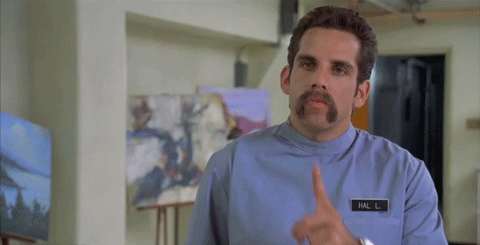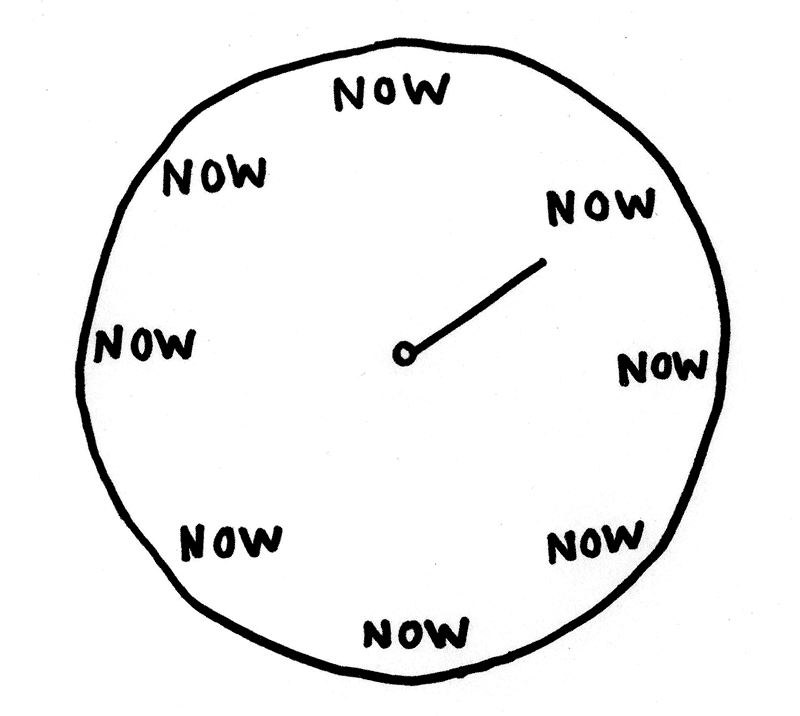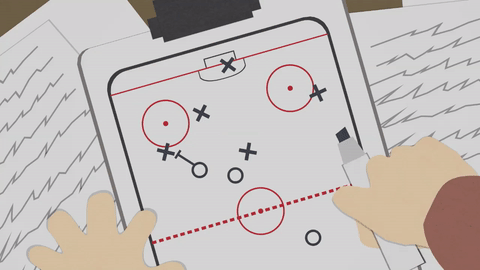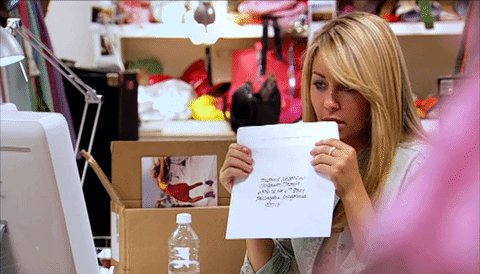Finding people to write letters of recommendation for grad school is next-to-impossible. It’s the “I-want-to-tear-my-hair-out” frustration that makes you hate yourself because until now, the furthest you’ve thought ahead was dinner plans, let alone what kind of teacher-student relationships would advance you to the next rung on the educational ladder. Well, kids, it’s time to get your head in the game. CM interviewed prestigious faculty to help students prepare for grad school with stacks of killer recommendation letters.
1. Be Face-y

Let’s be honest: For those that attend large universities, it’s tempting to slip out of a lecture hall of 300 students for a bagel at Einstein’s instead of listening to a professor drone on. But the more bagels you skip class for, the less chance to make yourself known to a potential recommendation letter candidate. “Raise your hand, share your ideas, try to rally your classmates to enrich the discussion,” said FSU rhetoric professor Martha Canter. “I remember students who speak up in classes, even when they’re unsure of their ideas because doing so stimulates great discussion and facilitates learning. And it’s kind of brave, too, and it’s memorable.”
2. Actually Visit Office Hours

No, professors don’t just block away two hours of their time and call it “office hours” for fun. This is a student’s time to develop a teacher-student relationship. “It’s really important to build those relationships. I was always the one in office hours, staying after class talking to my professors, always sitting in the front,” said FSU communications TA Lauren Anderson. “My professors always knew who I was, even in 300 person lecture halls. So when the time came, and I needed those letters, I never felt awkward going up to professors and asking for help.”
3. Fake it ‘Til You Make it

After trying to find out what kind of students professors even wanted to write about, professors said they just want to write about students they remember. FSU communication professor Mark Zeigler said, “I look for students with stellar attendance records, ones that put out quality work and you can tell they aren’t just ‘skirting by,’ like they won’t be able to do when they’re graduate students.” Put simply, be the student you feel deserves to be written about.
4. Hold Your Tongue

College students have a tendency to view professors as education robots that lack intuition and get plugged back into their sockets when the university closes down for the night. FSU English professor Laci Mattison said, “I overheard a student once complaining about her grade on a project in a rather disrespectful way. This student later asked me for a letter of recommendation.” Don’t be the student that uses teachers while scrambling to find letters, and if you are that student, at least make sure you haven’t bad-mouthed them in the past. They’ll remember you and your not-so-kind words.
5. Don’t Be a Suck-Up

It’s easy for professors to know when a student is fake, so keep your interactions genuine. We’ve all been in class with someone who enjoys being teacher’s pet too much; it’s more than obvious when someone is brown-nosing.“One tip: Don’t [go to office hours] just to suck up. Most instructors spot obsequiousness coming down the hall. When you meet with your instructors, show up prepared to discuss your ideas or concerns as they relate to class, but be real; let the discussion evolve naturally,” Canter said.
6. Greet Teachers in the Wild

Seeing your stats professor wandering around Publix with a roll of cookie dough unsettles even the strongest of us. However, most professors want you to approach them if you run into them outside of class. Zeigler recommended that students maintain a relationship with their professors after they complete the course and not just when they need a letter. “If they saw you walking on campus, they would come up to you and say ‘How are classes going?’ and I would say to them ‘what are you taking this semester? And what’s going on?” Zeigler said. Keep the topics professional, but don’t worry: Just because professors are in the wild doesn’t mean that they’ll bite.
7. Ask Ahead of Time

Avoid sending a professor a request for a letter of recommendation a week before and expecting the professor to pop it out like a candy machine. “Give your professor plenty of time to write the letter. Make sure you give him several weeks so he can add the task to his schedule. Instructors don’t just whip these out. They are not copy and paste letters,” Canter said. The consensus among professors interviewed was to send your request for a recommendation letter at least one month before the application deadline.
8. Know Who to Ask

Don’t be the guy that only bonded with one teacher his freshman year during a liberal arts class. When applying to specific graduate programs, it’s important to use applicable letters of recommendation for the sake of credibility.“Ask professors in your field, and those whose classes you’ve had in recent semesters. If you have to go back four years to your first semester to get a decent letter of recommendation, that could bode poorly for you,” Canter said. Sorry, the teacher of your Harry Potter themed lit course may not be your best bet when applying to graduate school for actuarial science.
9. Equip the Professor

Asking for a recommendation letter with zero context isn’t enough. Zeigler said that giving a professor an envelope with all of your forms, the schools you’re applying to, deadlines, your resume and personal statement makes the life of the writer so much easier. “What will happen is, when it’s time to write letters, the ones I do first are the ones that I have a packet for. If you just ask me to write a letter without any of that, yours is the last that is going to get done,” Zeigler said. The more you give your professor to work with, the better they can make you look in the letter.
10. Show Your Gratitude

Whether or not you get into your grad school of choice, practice professionalism by sending your professor a thank you note for her kind words. “Even if it’s a small token of your gratitude, we don’t see it that often, and if we get a note, it’s like ‘wow, I don’t have any thank-you notes, I’m going to put this up,’” FSU Italian Language Department head Katy Prantil said. “I had a student bring me some chocolates once.” At the end of the day, these professors are probably saying really nice things about you, so update them on the status of your applications so they’re encouraged to aid helpless students like you in the future.
More Tips for Asking for the Perfect Recommendation Letter
Written by Keristen Lucero
Applying to the first internship or job in the field of your major will feel nerve-wracking, like diving straight into the land of the unknown. The process does not stop at the interview, however. Your charming smile and hilarious work anecdotes might dazzle the interviewer. But they still want to know firsthand what it’s like to work with you. Cue the recommendation letter. These letters basically provide a cover letter to the employer, except someone else speaks on behalf of you. So this can make or break you.
1. Determine who to ask for your recommendation letter

No, your family doesn’t count and neither does your middle school coach. You want someone who looks at your body of work like your dog looks at you: with admiration and unconditional support. Start with doing the research. You should find out what skills the company looks for in employees. Then reflect on where you demonstrated these skills. Operations manager at Burns Entertainment Janell Santiago said companies look for traits that suggest things like your work ethic because it can also speak about your attendance at work. “I think worth ethic can say a lot about different areas of a person without having to ask straight out,” said Santiago.
Indiana University career coach Lauren Little suggested choosing someone who has worked with you previously, such as a supervisor or even a peer in context. “You ideally want someone who has known you longer than six months,” said Little. However, they find a relationship of about four months acceptable for students. “Make sure they know you in a context you want them to convey,” said Little. If you can get a letter of recommendation from someone known by the organization, it will help you stand out.
2. Decide when to ask for your recommendation letter

Figuring out when to ask for a reference letter might make you feel like a little kid waiting for the right moment to ask their mom if their friend can sleepover. Just ask now. Now is the best time to ask someone to write you a letter of recommendation. Waiting will not change the answer. Plus, it gives you time to check in on the progress and remind them about it, but it also allows time for them to show you the letter and have them edit anything they may need to for you, suggested Little.
Little recommended that you use the “exit strategy,” which means asking for a letter when you have two to three weeks left of an internship. This letter can feature generic information and demonstrate the skills used during your time there. Address the letter with “Dear hiring manager.” Later on, when you search for new jobs or internships, you have these references in your back pocket. You can go back to them and ask for them to make a few changes to make it addressed more specifically for the new company you hope to add to your resume.
3. Ask for your recommendation letter without begging

“It is best to ask for a letter of recommendation verbally either over the phone or face to face,” said Little. This is pretty much the best way to ask for anything from an employer or advisor. While you ask, give a framework for the letter by sharing a couple of points you want the writer to address. This will help the writer talk about what your future employer wants to see in the letter. Make sure to also ask the writer to mention a specific project you worked on with the skills you developed at the internship or in the class.
4. Figure out what you want highlighted in that recommendation letter

Another element that matters lies in the cream of the Twinkie. What your references write about in the letter gives the company a chance to get to know you and grow comfortable with you. Make sure the letters speaks about both your skills and your personality. Now gives you the perfect chance, maybe even your only chance, to brag about an odd ball job or volunteer event. The letter should include a specific experience that shows how you demonstrated a skill, such as teamwork. “A lot of times organizations will pass up on someone because their personality isn’t a good fit for the company,” said Little.
5. Now hand over that recommendation letter to the employer

Each company will have a different preference for how they want the letters submitted. Make sure you follow their guidelines. However, Little said employers don’t always require letters. Santiago also said she didn’t really know many companies that require them. “It can just be an extra boost for a potential candidate,” said Santiago. Santiago suggests sending one to two letters of recommendation. Attach them to your cover letter to give you an edge and help you stand apart from other applicants as suggested by Little.
**Updated on January 22, 2018 to include “More Tips for Asking for the Perfect Recommendation Letter” by Keristen Lucero



















